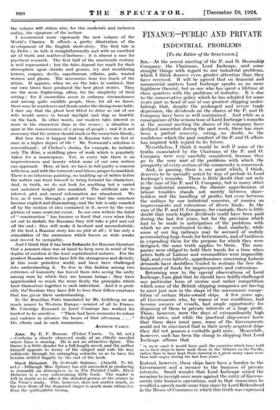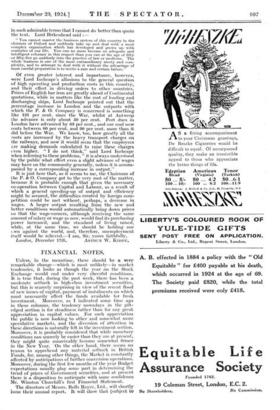FINANCE-PUBLIC AND PRIVATE
- INDUSTRIAL PROBLEMS
[To the Editor of the SPECTATOR.] SIR,-At the recent meeting Of the P. and 0. Steamship Company, the Chairman, Lord Inchcape, said some straight things with regard to our industrial problems, which I think deserve even greater attention than they have received. It will be 'agreed that on financial and commercial matters Lord Inchcape speaks as no mere highbrow theorist, but as one who has spent a lifetime at close quarters with the problems of industry. It is due to the conservative policy which he has adopted for some years past as head of one of our greatest shipping under- takings that, despite the prolonged and severe trade depression, the dividends on the shares of the P. and 0. Company have been so well maintained. And while as a consequence of the serious tone of Lord Inchcape's remarks at the annual meeting the shares of the company have declined somewhat during the past week, there has since been a partial recovery, owing, no doubt, to the confidence which the past conduct of the P:and 0. affairs has inspired with regard to its 'future. Nevertheless, I think it would' be well if some of the truths enunciated by the Chairman of the P. and 0. Company were very carefully considered, because they go to the very root of the problems with which the prosperity of every section of the community is concerned. And, in passing, there is one point which, I think, deserves to be specially noted by way of prelude to Lord Inchcape's remarks. There is little doubt that not only in the case of the P. and '0. Company, but in many other large industrial concerns, the chronic apprehension of labour troubles stands not merely between share- holders and the handling of profits, but even" between the outlays by our industrial concerns, of monies on ithprovements and extensions of divers kinds. In the case of the P. and-O. Company, for example, there is little doubt-that much higher dividends could have been paid during the last few years, but for the prOvisiOn which had to be made in anticipation of the problems with which we are Confronted to-day. And, similarly, while some of our big railways may be accused of unduly accumulating huge funds for betterments, and of tardiness in expending them for the purpose for which they were designed, the same truth applies to them. The com- panies were obliged to hold their hands for a time when prices both of Labour and commodities were impossibly high, and, even latterly, apprehensions concerning Labour demands have doubtless tended to restrain the free dis- bursement of funds for improvements and extensions. Returning now to the special observations of Lord Inchcape, lam glad that he should have boldly challenged one particular form of unwise and unfair competition which some of the British shipping companies are having to meet just now in the shape of the uneconomic compe- tition of certain State-owned ships. A few years ago, all Governments who, by reason of war conditions, had become owners of vessels, had ample opportunity for disposing of them to private interests at a large profit. Those, however, were the days of extraordinarily high freight rates, and while the practical ship-owner knew that those days must pass, some of the Governments could not be convinced that in their newly acquired ships they did not possess a veritable gold mine. Meanwhile, however, such has been the slump in shipping that Lord Inchcape affirms that `. in most ease i it would have paid the countries which have held on to their ships to have sunk them in the Atlantic or the Pacific, rather than to have kept them running in a great many cases more than half empty during the last four years."
Instead, however, these ships have been a burden to the Government and a menace to the business of private interests. Small Wonder that Lord Inchcape seized the occasion to inveigh once more against the entry of Govern- ments into business operations, and in that connexion he recalled, a speech made some time since by Lord Birkenhead in the House of Com-mons' in Which this truth was expi.essed • in such admirable terms that I cannot do better than quote the text. Lord Birkenhead said :— " You cannot master the business system of this country in the cloisters of Oxford and suddenly take up and deal with a most complex organization which has developed and grown up with centuries of our life. You can no more become an adequate and intelligent reformer in this respect than you can at the age of fifty - or fifty-five go suddenly into the practice of law or medicine. The whole business is one of the most extraordinary nicety and com- plexity, and to attempt to deal with it without the advantage of most careful preparation is to invite a sure and certain failure."
Of even greater interest and importance, however, were Lord Inchcape's allusions to the general question of high operating and production costs in this country, and their effect in driving orders to other countries. Prices of English bar iron are greatly ahead of Continental quotations, while in matters like the cost of loading and discharging ships, Lord Inchcape pointed out that the percentage increase in London and the outports with which the P. & 0. Company is concerned is something like 131 per cent, since the War, whilst at Antwerp the advance is only about 50 per cent. Port dues in London have advanced by 63 per cent., and our coal now costs between 80 per cent. and 90 per cent, more than it did before the War. We know, too, how greatly all the costs are increased by the heavy transport charges on the railways, and now it would seem that the employees tre making demands calculated to raise these charges even higher. "I do not think," said Lord Inchcape when referring to these problems," it is always understood by the public what effect even a slight advance of wages may have on the community generally, unless it is accom- panied by a corresponding increase in output." It is just here that, as it seems to me, the Chairman of the P. & 0. Company got to the very root of the matter, because it is probable enough that given the necessary co-operation between Capital and Labour, as a result of which a general speeding-up of output and efficiency might be secured, the difficulties created by foreign com- petition could be met without, perhaps, a decrease in wages. A larger output resulting from the new and better conditions would automatically bring down prices so that the wage-earners, although receiving the same amount of salary or wage as now, would find its purchasing power increased, and the standard of living raised, while, at the same time, we should be holding our own against the world, and, therefore, unemployment itself would be relieved.—I am, Sir, yours faithfully,











































 Previous page
Previous page